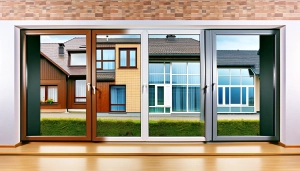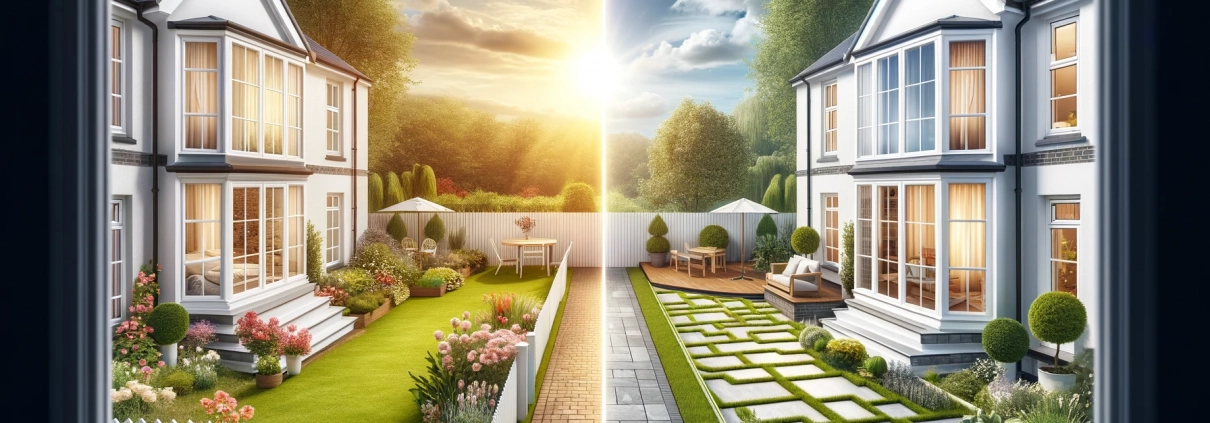UPVC vs. Aluminium Windows
Making the Right Choice: UPVC vs Aluminium Windows for Your Home
Table of Contents
Choosing the right material for your windows is a decision that affects not only the appearance of your home but also its energy efficiency, security, and maintenance requirements. Two popular choices in today’s market are UPVC and aluminium. Each has its own unique strengths and potential drawbacks, making this decision a critical one for homeowners and builders alike. Understanding the insulating properties, durability, and cost-effectiveness of UPVC, as well as the sleek design, strength, and recyclability of aluminium, is key to making an informed choice that aligns with your specific needs and preferences.

The Basics of UPVC
Durability, Affordability, and Weather Resilience
Unplasticised Polyvinyl Chloride, commonly known as UPVC, has become a prevalent choice for windows in the UK. UPVC is a form of plastic and is known for being robust, durable, and affordable. Its resilience against weather elements makes it a long-lasting option for many homes.
Benefits of UPVC Windows
One of the main advantages of UPVC windows is their low maintenance. They do not require painting or sealing and are resistant to rust, corrosion, and termite attacks. UPVC windows are also known for their excellent insulation properties, contributing to better energy efficiency in homes by reducing the need for heating and cooling.
Potential Drawbacks
However, UPVC can have limitations in terms of aesthetics. The plastic look may not appeal to everyone, and there are fewer colour options compared to aluminium. Over time, UPVC can also discolour and become brittle due to exposure to extreme weather. However, advancements in technology have led to improvements in UPVC design, offering more customization options and enhanced durability, though it still lags behind materials like aluminium in these aspects.
Exploring Aluminium Windows
Characteristics of Aluminium
Aluminium windows, renowned for their sleek and modern appearance, bring a different set of attributes to the table. Aluminium is a metal, making it inherently strong and durable. This strength allows for thinner frames and more glass, which can be a significant aesthetic advantage.
Advantages of Aluminium Windows
The durability of aluminium windows is a major plus. They can withstand harsh weather conditions and are not prone to warping or rotting. Aluminium frames can also be recycled, making them a more environmentally friendly option. In terms of design, they offer a wider range of finishes and colours.
Possible Downsides
On the downside, aluminium can be more expensive than UPVC. It is also a conductor of heat, which means that without proper thermal breaks, it may not insulate as well as UPVC. This can lead to higher heating costs in colder climates. Additionally, due to its susceptibility to corrosion in certain environments, maintenance requirements for aluminium can be higher compared to UPVC, potentially adding to long-term costs.
Comparative Analysis: UPVC vs. Aluminium
Cost Comparison
When it comes to cost, UPVC windows generally come out as the more budget-friendly option. They are cheaper to manufacture and install. Aluminium windows, while more expensive, offer a premium look and greater longevity, which might justify the higher price for some. Moreover, the initial investment in aluminium windows can be offset by their exceptional durability and minimal maintenance requirements, potentially resulting in long-term savings and enhanced property value over time.
Aesthetic Appeal
Aesthetically, the choice between UPVC and aluminium might come down to personal preference and the style of the property. Aluminium offers a more contemporary look, ideal for modern homes, while UPVC is often preferred for its classic appeal. Additionally, considerations such as architectural design, color options, and customization capabilities play a significant role in determining which material best complements the aesthetic vision of the property, catering to diverse tastes and design preferences.
Energy Efficiency and Environmental Impact
Energy efficiency is another crucial factor. UPVC windows have excellent insulating properties. However, advancements in aluminium window technology, like thermal breaks, have significantly improved their energy efficiency. Environmentally, aluminium’s recyclability gives it an edge, although UPVC’s long lifespan also contributes positively to its environmental impact.
UPVC Windows: Resilient Against the Elements
Weather Resistance
When investing in new windows, considering their lifespan and ability to withstand various elements is paramount. Both UPVC and aluminium score highly in terms of durability, but in slightly different ways. UPVC is known for its resistance to weathering. Unlike wood, it doesn’t swell, warp, or rot in damp conditions, making it an excellent choice for the UK’s varied climate. However, UPVC can become brittle and discolour after prolonged exposure to sunlight.
Longevity
Typically, UPVC windows have a lifespan of around 20–25 years, making them a reliable option for homeowners looking for durability without constant upkeep. Moreover, UPVC windows are known for their low-maintenance nature, requiring only occasional cleaning and minimal upkeep throughout their lifespan, further enhancing their appeal to homeowners seeking hassle-free solutions.
Aluminium Windows: Strength and Stability
Enduring Strength
Aluminium is inherently strong, which means it can handle more weight than glass and withstand high winds and other extreme conditions. This strength ensures the frames remain stable and secure over time. Furthermore, the durability of aluminium makes it a popular choice for architectural projects where longevity and structural integrity are paramount, offering peace of mind to homeowners and builders alike.
Extended Lifespan
Aluminium windows can last up to 30–40 years, significantly longer than UPVC, primarily due to their resistance to rust, corrosion, and UV rays. Furthermore, the robustness of aluminium against environmental factors makes it a durable choice for regions with harsh weather conditions, providing extended longevity and value for homeowners seeking long-term investment in their property. In conclusion, choosing between UPVC and aluminium windows depends on your specific needs and priorities. UPVC offers affordability and excellent insulation, making it ideal for budget-conscious homeowners prioritising energy efficiency. Aluminium, on the other hand, stands out for its strength, durability, and sleek, modern aesthetics, appealing to those looking for a long-term investment and a contemporary look. Both options present their own unique advantages in terms of maintenance, longevity, and value addition to your property. Understanding these factors will help you make an informed decision that best suits your home and lifestyle.





